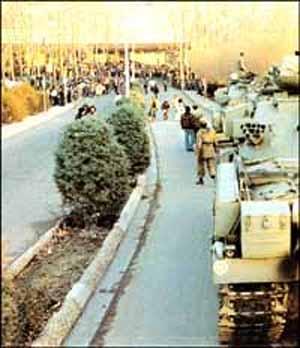General Ramtin's Account of How to Store Weapons
Compiled by: Islamic Revolution Website
Translated by: Fazel Shirzad
2024-10-29
I remember that we were in Bakhtiar's Palace on the night of 22 Bahman (10th February). There was also wireless telephone. Two or three of my colleagues and I were in the telephone room, and according to the words of the police officers whose wireless telephone was on; We heard that the police station fell down somewhere, the police station fell down here and there. Then we talked and said to come and get Bakhtiar tonight. Bakhtiar belonged to the upper class. Another thing is that there is a police station at the first of Jami Street, which was called "Center Police Station" at that time. On the wireless telephone, we could hear an officer saying that people have dropped, what should I do with the guns? The one who was talking to him said: I don't know what to do. He said: I can keep two or five of them, what should I do with the rest? This issue made me think about the storage of weapons and that we should keep and preserve these weapons in any way possible. Then with some colleagues, we started to bring weapons and collected them and appointed some people to guard them; because we heard that the people of the gangs had brought a number of Afghans and told them to go and get whatever weapons and ammunition there are and bring them and we will give you two thousand tomans (Iranian currency). Later, the issues that the hypocrites raised for the revolution probably originated from here. Well, that's what we came up with after hearing that wireless and figured out what to do in that situation. Of course, before these talks happen at all; the army was with the people and had no problem with them. We thank God, we did it, and Alhamdulillah, not a single needle point was lost from our weapons and we used all of them twice. Six days had passed since the victory of the revolution; That is, on February 28, I was at home at two in the morning when they said that Sanandaj was crowded.

I got up at two o'clock and came, ten or twelve of these comrades, some of whom have now been martyred, I called and they came with guns and a truck. In short, we used the same weapons in the missions that happened in Sanandaj and in other places.[1]
[1] Source: Oral History of the Army in the Islamic Revolution, edited by Heshmatullah Azizi, Tehran, Islamic Revolution Documentation Center, 2016, pp. 97-98.
Number of Visits: 172








The latest
- Exiling Hujjat al-Islam Wal-Muslimeen Mohammad Mahdi Roshan to Zabul
- The 359th Night of Memory – 2
- What will happen for oral history in the future?
- Oral History Does Not Belong to the Realm of Literature
- Da (Mother) 124
- Memories of Muhammad Nabi Rudaki About Operation Muharram
- Study and Research as Foundations for the Authenticity of Narrators
- The 359th Night of Memory – 1
Most visited
- Da (Mother) 123
- Imam’s Announcement in the Barracks
- Study and Research as Foundations for the Authenticity of Narrators
- Night raid and brutal arrest
- The 359th Night of Memory – 1
- Memories of Muhammad Nabi Rudaki About Operation Muharram
- Oral History Does Not Belong to the Realm of Literature
- Da (Mother) 124
Destiny Had It So
Memoirs of Seyyed Nouraddin AfiIt was early October 1982, just two or three days before the commencement of the operation. A few of the lads, including Karim and Mahmoud Sattari—the two brothers—as well as my own brother Seyyed Sadegh, came over and said, "Come on, let's head towards the water." It was the first days of autumn, and the air was beginning to cool, but I didn’t decline their invitation and set off with them.
The interviewer is the best compiler
According to Oral History Website, Dr. Morteza Rasoulipour in the framework of four online sessions described the topic “Compilation in Oral History” in the second half of the month of Mordad (August 2024). It has been organized by the Iranian History Association. In continuation, a selection of the teaching will be retold:The Last Day of Summer, 1980
We had livestock. We would move between summer and winter pastures. I was alone in managing everything: tending to the herd and overseeing my children’s education. I purchased a house in the city for the children and hired a shepherd to watch over the animals, bringing them near the Karkheh River. Alongside other herders, we pitched tents.Memoirs of Commander Mohammad Jafar Asadi about Ayatollah Madani
As I previously mentioned, alongside Mehdi, as a revolutionary young man, there was also a cleric in Nurabad, a Sayyid, whose identity we had to approach with caution, following the group’s security protocols, to ascertain who he truly was. We assigned Hajj Mousa Rezazadeh, a local shopkeeper in Nurabad, who had already cooperated with us, ...

